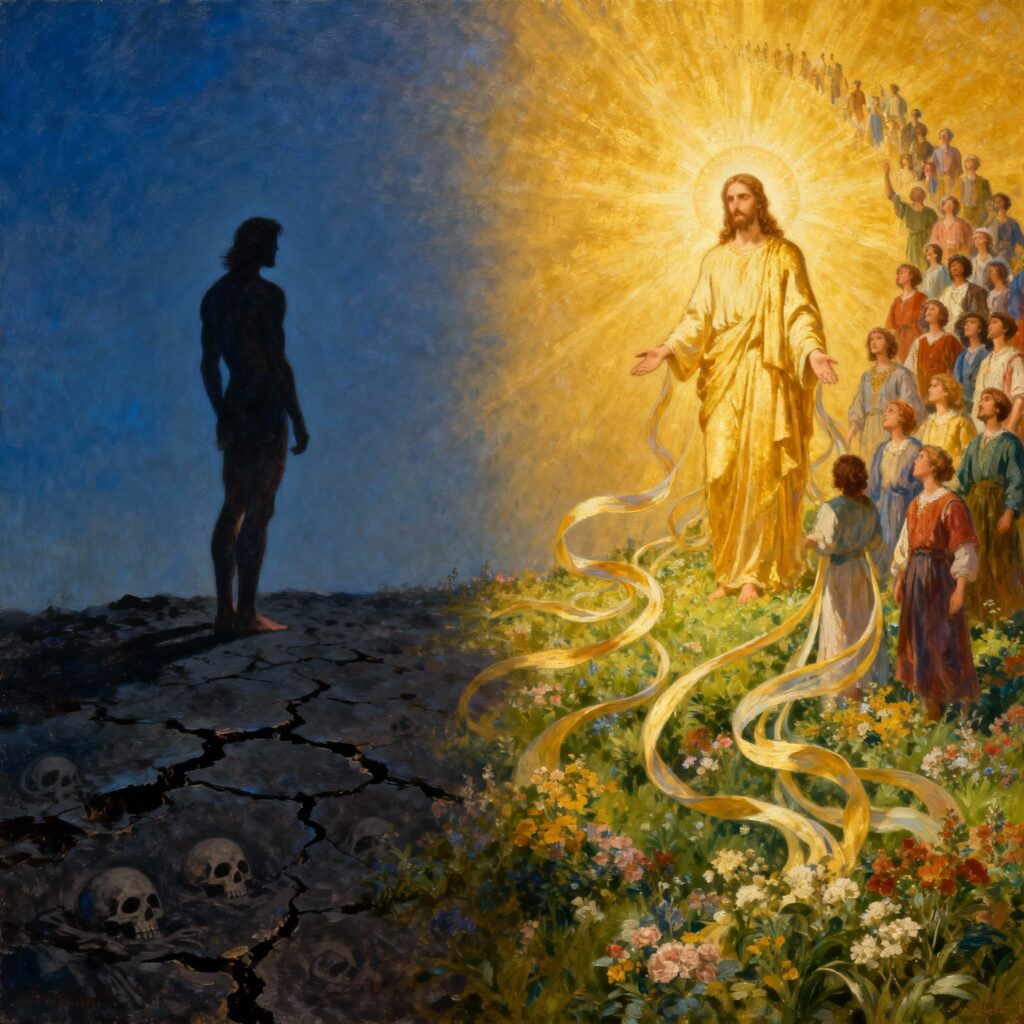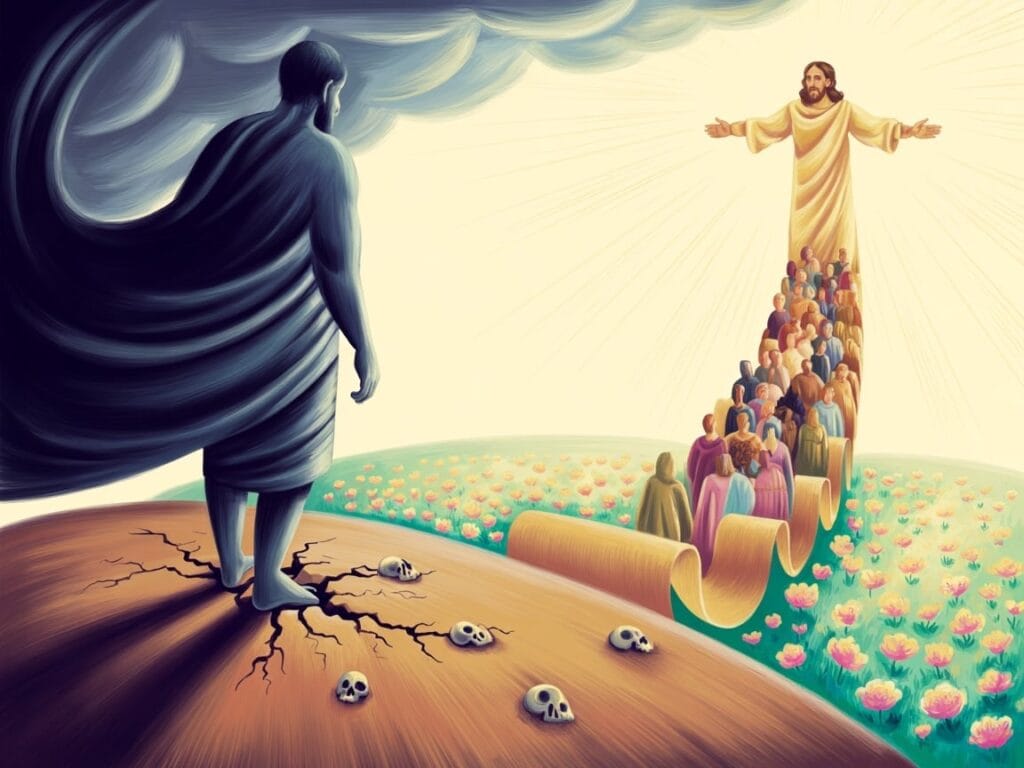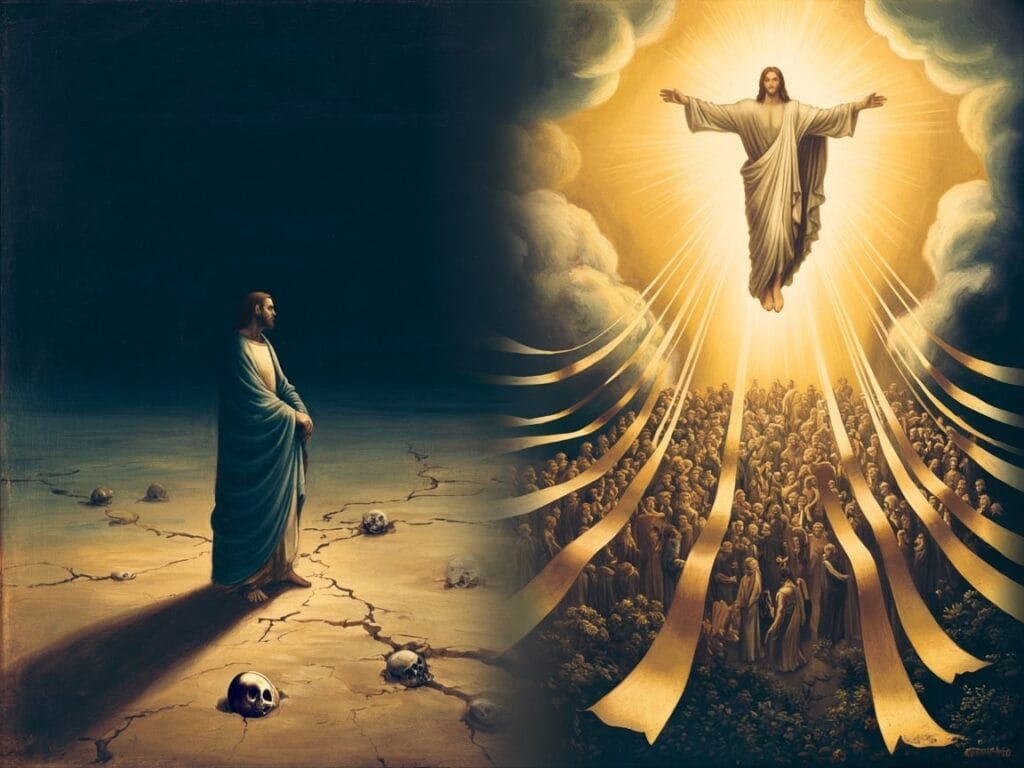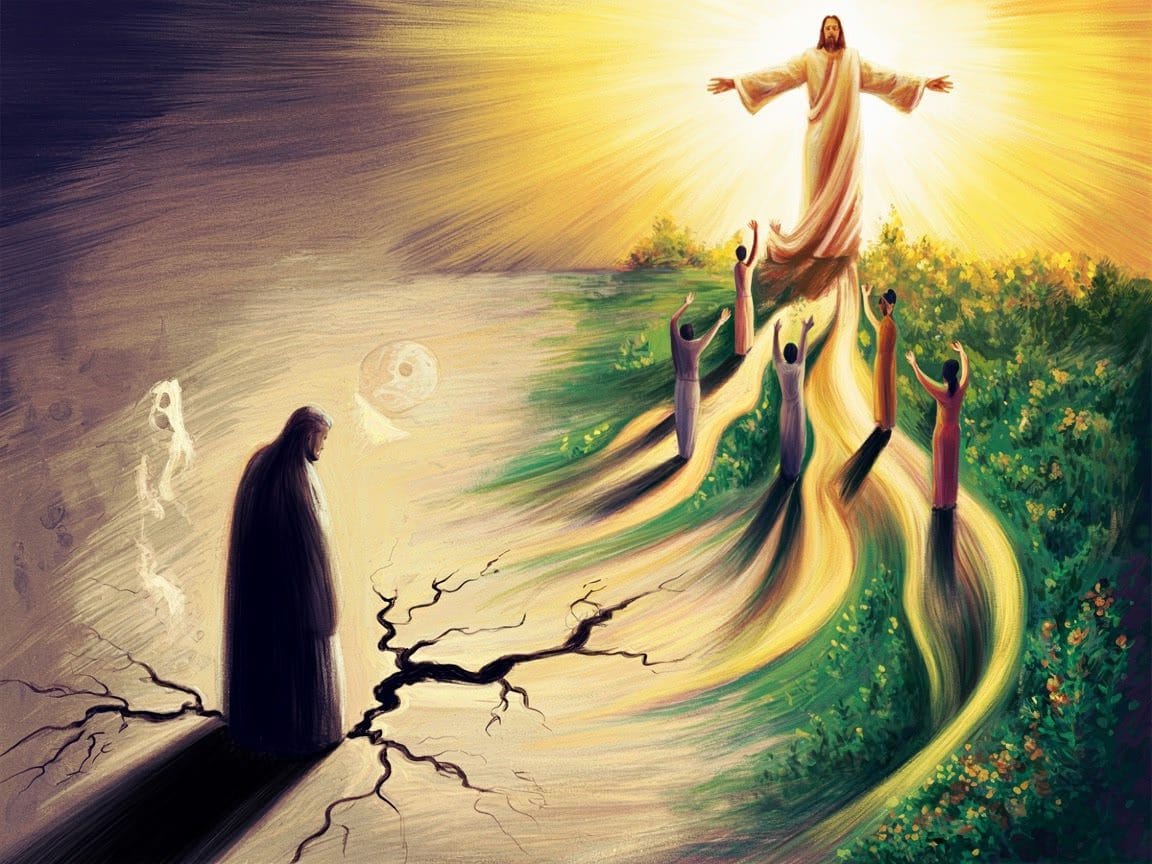Reading from the Letter of Saint Paul the Apostle to the Romans
Brothers,
we know that by one man,
sin entered the world,
and that by sin came death;
and so death passed into all men,
since all have sinned.
If death has struck the multitude by the fault of one,
how much more the grace of God
has it been poured out in abundance upon the multitude,
this grace which is given in one man, Jesus Christ.
If, indeed, because of one man,
through the fault of one,
death has established its reign,
how much more, because of Jesus Christ and him alone,
will they reign in life,
those who receive in abundance
the gift of grace that makes them righteous.
In short, just as the fault committed by a single
brought all men to condemnation,
likewise the accomplishment of righteousness by one
has brought all men to justification which gives life.
Indeed, just as by the disobedience of a single human being
the multitude has been made sinners,
likewise by the obedience of one
will the multitude be made righteous.
Where sin has multiplied,
grace has abounded.
So then, just as sin has established its kingdom of death,
so grace must establish its reign
rendering righteousness unto eternal life
through Jesus Christ our Lord.
– Word of the Lord.
Reigning in Life: Welcoming the Abundance of Grace
How the dynamics of giving free man from the invisible realm of guilt
The passage from the letter to the Romans that the liturgy proposes places us before a founding contrast: the fault of one made death reign, the obedience of one made life reignThis text, both dense and luminous, invites everyone to meditate on the logic of the gift that runs through all of Christian revelation. It is addressed to those who, at the heart of the contemporary world, struggle to believe that life can truly prevail over the forms of death—spiritual, social, interior—that corrode existence.
This is not an abstract treatise, but a vibrant call to become, from now on, participants in the reign of grace.
- Context – The vital and theological framework of Romans 5.
- Central analysis – The Pauline reversal: from the reign of death to the reign of life.
- Thematic deployment – Three perspectives: human solidarity, the superabundance of grace, the vocation of the just.
- Resonances – Biblical and spiritual echoes of unique obedience.
- Practice tracks – Welcome the life that already reigns.
- Conclusion and practical sheet – Inscribe grace into our daily rhythms.

Context
The fifth section of the letter to the Romans condenses one of Paul's most powerful arguments. He develops a theology of recapitulation where human destiny is carried by two symbolic figures: Adam And Christ.
Adam embodies the human condition left to its own autonomy: by his disobedience, he introduces a rupture into the world - that of trust in the creative gift. From this rupture is born death, not as an external punishment, but as internal disorder of the relationship, cutting of the vital link with the Source.
Paul is therefore not describing a mythological landscape, but the existential drama of all humanity: we experience the force of evil as an internal law, "installed" in reality. Death reign because it organizes, often without our knowledge, the logic of fear, exclusion and pride which govern society and hearts.
Then the second Adam, Christ, not to cancel history but to restore communion at its root. By a single act of obedience—his filial trust even to the cross—he opens up a completely new space: the reign of grace.
Grace, in Paul, is not simple benevolence: it is the invigorating force of free giving which transforms the human condition from within. It does not deny the reality of sin; it passes through it and goes beyond it.
The passage is part of a letter addressed to a cosmopolitan community, divided between Christians of Jewish and pagan origin. Paul seeks to show that redemption in Christ is not the privilege of a people or an elite, but the universal principle of justification and life.
His demonstration is based on a parallel logic: "just as... so too...". By opposing the disproportion between the fall and the rise, he makes us feel that Grace is not reparation; it is recreation.
The liturgical extract culminates in this moving sentence: “Where sin abounded, grace did much more abound.” This statement completely reverses our imagination of guilt: nothing, absolutely nothing, can resist the flow of the gift that flows from the life of Christ.
It is therefore not just a consolation: it is a manifesto. Humanity, marked by death, is invited to reign in life, to exercise a new royalty — that of the transformed heart.
From the reign of death to the reign of life
The key to the passage lies in the verb "to reign." Paul is not speaking here of a specific episode, but of sovereign dynamicsDeath is not a simple biological event; it has taken its place in the structures of the world as a force of domination. It imposes its law through fear, inertia, and the closure of man in himself.
In front of her, grace does not appear as a fragile resistance, but as an alternative reignThrough Christ, God proposes a new order where justice is not imposed from outside, but is rooted in being.
To reign in life therefore means participate in the lordship of the Risen One, to receive within oneself the very movement by which the Son offers himself to the Father and to men. The believer leaves the relationship of debt and enters into that of gratuitousness.
This analysis leads us to reread our own experience: whenever death reigns—in guilt, resentment, or indifference—it becomes possible to introduce a breach. What Paul calls “the gift of grace” is not an idea: it is an active power, capable of reconfiguring relationships, institutions, consciences.
The superabundance of grace is therefore the opposite of the economy of merit. Where sin "counts," grace "gives without counting." Its logic is neither moral nor legal, but existential: it brings into existence anew.
So, to reign in life is not to possess victory; it is let Life possess our gestures.

Human solidarity: a single story
Paul bases his reflection on the principle of solidarityHumanity is not a sum of individuals, but a body linked through time. What one does resonates in all.
Adam represents the first link in a chain of men and women who, believing they were asserting themselves against God, locked themselves into a logic of separation. We are born into this climate; not by biological inheritance, but by contagion of consciousness.
To recognize this solidarity of the fall is also to welcome that of the recovery. Christ does not come "outside" of humanity; he comes in her. By fully assuming the condition of creature, he reopens from within the possibility of filial obedience.
Thus, Christian brotherhood is not a metaphor: it stems from the very system of salvation. The unity of the human race becomes the scene where grace is displayed.
The Superabundance of Grace: Excess Rather Than Balance
Paul insists: grace overabundantThis surplus is provocative. In our human logic, repairing supposes compensating; but here, God exceedsIt does not only equalize; it elevates.
This overabundance is the sign of free love. Evil, even massive, does not have the last word; it becomes the site of a broader response. Human history, instead of being desperate, becomes the scene of a permanent reversal.
In everyday life, this translates into gestures of forgiveness, acceptance, and recovery. Each time someone chooses to restore trust, the logic of giving takes precedence over that of fault.
Pauline spirituality is therefore eminently concrete: it calls for over-respond to death by life.
The vocation of the righteous: to reign humbly
“To reign in life” does not mean to dominate, but serve from inner fullness. The righteous, in Paul's perspective, is not the one who no longer has a fault, but the one whose fault opens to grace.
This reign is exercised first on oneself: on our automatisms, our judgments, our refusals to love. Then it unfolds in the community: where death excluded, the just welcomes; where fear divided, it connects.
To live in this way is to extend the attitude of Christ the servant: an authority without domination, a freedom rooted in giving.

Resonances
Paul's thought finds countless echoes in tradition. Irenaeus of Lyons will speak of recapitulation: Christ retraces Adam's path in reverse, restoring to humanity its filial face.
Augustine will develop the idea of a united humanity, marked by the transmission of sin - but also, and more profoundly, by the diffusion of grace.
Thomas Aquinas will interpret the term "to reign" as man's participation in the kingship of Christ: to be free is to let reason order love according to charity.
In the liturgy, this passage illuminates the Easter season. It establishes the joy of the Resurrection: victory over death is not future, it begins now for those who believe.
Many spiritual figures, from Francis of Assisi to Charles de Foucauld, have drawn their way of existing from it: live in radical gratitude, because everything comes from an excess of giving.
Meditations
- Read slowly the passage from Romans 5, identifying the oppositions: one / the multitude, fault / grace, death / life.
- Appoint in his own life a space where “death reigns”: resignation, injury, guilt.
- To welcome the word of Christ as an interior response: even where sin has abounded, grace can abound even more.
- Thank for the gift now received, even before feeling its effect.
- Act concretely: to perform an act of recovery for others — forgiveness, free attention.
- Contemplate then the peace that emanates from this choice: it is life that reigns.

Conclusion: Living in abundance
Reading Romans 5 reminds us that the Christian faith is not just belief, but participation in a new lifestyleWhere man saw an irreversible separation, God establishes a communion.
Christ does not remove fragility; he makes it the place of his victory. Therefore, to reign in life is not to elevate oneself, but to let the power of giving rise within oneself.
In our societies saturated with performance and accusation, rediscovering the Pauline logic of grace means breathing differently. Everyone can become a discreet witness to this superabundance: through patience, kind words, and the rejection of cynicism.
Let this passage not remain a summit of doctrine, but a matrix of existenceWhere death believes it reigns, grace already gives rise to life.
Practical
- Meditate on a sentence from Romans 5 every morning, reading it aloud.
- Identify a specific place during the day where life can reign more.
- Replace guilt with an immediate act of gratitude.
- Exercising soft sovereignty: choosing peace over reaction.
- Traveling in Scripture: Comparing Romans 5 with Philippians 2.
- Keep a notebook of “superabundances”: these gifts received without merit.
- Celebrate every Sunday as an entry into the kingdom of life.
References
- The Jerusalem Bible, Romans 5, 12-21.
- Irenaeus of Lyon, Against heresies, V, 21.
- Augustine, Confessions And The City of God, XIII.
- Thomas Aquinas, Summa Theologica, IIIa, q.8.
- Francis of Assisi, Admonitions.
- HU von Balthasar, Grace and freedom.
- D. Bonhoeffer, Community life.
- Pope Francis, Evangelii Gaudium.



